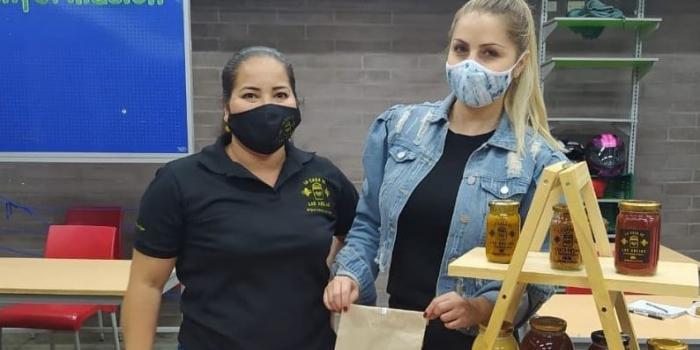
"La casa de las abejas": From forced displacement to a honey-flavored entrepreneurship
The forced displacement risk compelled Diana Bermeo to leave her home and start a new life in La Ceja (Antioquia), where she and her family created “La casa de las abejas” (The Bees’ House).

Outraged by bee extermination and encouraged by her natural products fondness and her resilient capacity to overcome forced displacement, Diana Patricia Bermeo and her family undertook a productive project five years ago; they focus on breeding and protect the so-called “most important animal in the world.”
“La casa de las abejas” is the family business they created in La Ceja (Antioquia). They work as diligent as this species does. They focus on rescue and relocation, honey manufacture, pollen, jellies, propolis and pollination to produce seeds and fruits; they also train students and farmers in beekeeping and environmental conservation.
Diana recalls that in 2016 “there was a lot of bee slaughter by farmers, flower growers, and by the chemicals use within crops as well. There weren’t such products as the ones we have on the market either, so we figured there was a business opportunity.”
Likewise, they also wanted to start a business and they were willing and resilient. The family arrived at this municipality years ago, after leaving their home in the Caqueta department to flee from guerrilla violence. She remembers that in 1999 "I had to move to avoid forced recruitment when the demilitarized zone happened."
Some years went by working with her husband, Sixto Garces, and their children Juan Jose and Violeta, and today, “La casa de las abejas” shows this family’s affinity with the bees as well as their own environmentalist spirit.
Winning business
That is why they felt so much joy this week, when they won the first place among 50 armed conflict victims’ enterprises from the whole country. In February, all the participants benefited from the certified course "Negocios para nuevos tiempos" (Business for new times); this happened thanks to an agreement between the Unit for the Victims and the Texmodas Foundation with the Universidad del Rosario support.
For Diana, this course, which was informed to her by La Ceja’s Mayor's Office Victims’ Liaison, "was a great opportunity to train ourselves further, to believe in our endeavors and to move forward. I thank the entities that supported us."
In addition to business model training, customer and consumer management, storytelling, structuring and costs preparation, 14 victims were awarded $28 million COP in seed capital to strengthen their productive projects.
According to Wilson Cordoba Mena, the Unit’s Antioquia Victims’ Reparation Director: “With this supply management and inter-institutional coordination to strengthen their business plans, socioeconomic stabilization is supported in order for these entrepreneurs to have better life and productivity conditions.”
The entity has supported the armed conflict victims’ business ideas through international cooperation and strategic alliances with public and private institutions, as well as training for micro-entrepreneurs, micro-franchise projects and business fairs.
(End/JCM/COG/RAM)






